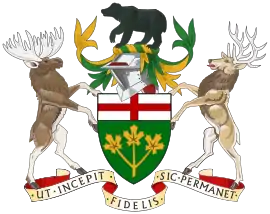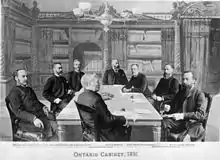Executive Council of Ontario
The Executive Council of Ontario (French: Conseil des ministres de l'Ontario), informally, and more commonly, the Cabinet of Ontario (French: Cabinet de l'Ontario), plays an important role in the Government of Ontario, in accordance with the Westminster system.
 |
|---|
| This article is part of a series on the politics and government of Ontario |
|
| See also |
| Politics by province / territory |

A council of ministers of the Crown chaired by the Premier of Ontario, the Executive Council, almost always made up of members of the Legislative Assembly of Ontario, advises the Lieutenant Governor of Ontario on how to exercise the executive functions of the Ontario Crown. The members of the council are appointed by the Lieutenant Governor, on the advice of the Premier. Though the Lieutenant Governor does not generally attend council meetings, directives issued by the viceroy on the advice of his or her ministers are said to be ordered by the Governor-in-Council. Ministers hold the honorific prefix "The Honourable" while members of the council.
The cabinet is thus similar in structure and role to the federal Queen's Privy Council for Canada, though smaller in size, and, whereas the federal cabinet is actually a committee of the Queen's Privy Council, the Executive Council of Ontario and Cabinet of Ontario are one and the same. Also, unlike the Queen's Privy Council, members of the Ontario Executive Council are not appointed for life, and are not entitled to post-nominal letters due to their position.
Most cabinet ministers are the head of a ministry, but this is not always the case. The Lieutenant Governor, advised by the Premier, determines which portfolios will be created. It is then up to the new minister to organize his or her department, and to present legislation for the new ministry if none exists.
Current cabinet
Doug Ford and his cabinet were sworn in by Lieutenant Governor Elizabeth Dowdeswell on June 29, 2018, after the previous government of Kathleen Wynne was defeated in the general election of June 7, 2018. On November 2, 2018, Jim Wilson resigned and his portfolio was assigned to Todd Smith on an interim basis. There was a small cabinet shuffle on November 5, 2018, that gave Todd Smith, the portfolio full-time. The portfolio of Minister of Government and Consumer Services was then assigned to the newest member of the Executive Council, Bill Walker, previously the Chief Government Whip. This cabinet shuffle also included having Michael Tibollo and Sylvia Jones swap their respective portfolios, Minister of Community Safety and Correctional Services and Minister of Tourism, Culture and Sport. The final piece to this cabinet shuffle saw Jeff Yurek swap portfolio with John Yakabuski.
On April 4, 2019, Sylvia Jones was sworn in as Solicitor General of Ontario.
On June 20, 2019, Premier Ford shuffled his cabinet, by making the following changes:
Former portfolios
- Ministry of Children's Services (2003–2004)
- Ministry of Citizenship and Culture (1983–1987)
- Ministry of Citizenship (1987–1995; 2001–2003)
- Ministry of Citizenship, Culture and Recreation (1995–2001)
- Ministry of Citizenship and Immigration (2016-2018)
- Ministry of Citizenship, Immigration and International Trade (2003–2016)
- Ministry of Colleges and Universities (1972–1993)
- Ministry of Community, Family and Children's Services (2002–2003)
- Ministry of Community Safety and Correctional Services (2003-2019)
- Ministry of Consumer and Business Services (2003–2005)
- Ministry of Consumer and Commercial Relations (1972–2001)
- Ministry of Correctional Services (1972–1993; 1999–2002)
- Ministry of Culture and Communications (1987–1993)
- Ministry of Culture, Tourism and Recreation (1993–1995)
- Ministry of Economic Development, Trade and Tourism (1995–1999; 2008–2011)
- Ministry of Economic Development and Trade (1999−2008)
- Ministry of Education and Training (1993–1999)
- Ministry of Energy and Infrastructure (2007–2010)
- Ministry of Energy, Science and Technology (1997–2002)
- Ministry of Enterprise, Opportunity and Innovation (2002–2003)
- Ministry of Environment and Energy (1993–1997; 2002)
- Ministry of Financial Institutions (1986–1993)
- Ministry of Health (1972–1999)
- Ministry of Housing (1973–1981; 1985–1995)
- Ministry of Industry, Trade and Technology (1985–1993)
- International Trade
- Ministry of Municipal Affairs (1985–1995; 2003–2004)
- Ministry of Public Infrastructure Renewal (2005−2008)
- Ministry of Public Safety and Security (2002–2003)
- Ministry of Research, Innovation and Science (2013–2018)
- Ministry of Revenue (1968–2012)
- Ministry of Skills Development (1985–1993)
- Ministry of the Solicitor General (1972–1993; 1999–2002)
- Ministry of the Solicitor General and Correctional Services (1993–1999)
- Ministry of Tourism (1999–2001)
- Ministry of Tourism, Culture and Recreation (2001–2002)
- Ministry of Transportation and Communications (1971–1987)
- Ministry of Treasury and Economics (1978–1993)
- Provincial Secretary and Registrar of Ontario (from 1961 Provincial Secretary and Minister of Citizenship) (list) (1867–1975)
.svg.png.webp)